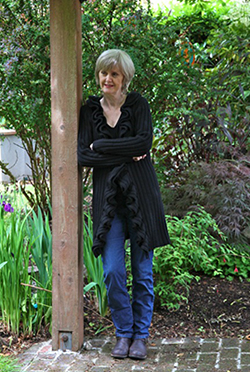A Win, A Shot in the Arm:
Curtis LeBlanc in Conversation
with Patricia Young

Photo credit: Claudia Haagen
PRISM international's executive editor of promotions, Curtis LeBlanc, talks with Long Poem Prize judge, Patricia Young, about patience in long-form poetry and the benefits of blind judging in creative writing contests.
Patricia Young has published eleven collections of poetry and one of short fiction. She has twice been nominated for the Governor General's Literary Award for Poetry. Her collection of short fiction, Airstream, won the Rooke-Metcalf Award, was shortlisted for the Victoria Butler Prize, and was named one of the Globe and Mail's Best Books of the Year. She recently won Prairie Fire's fiction contest and placed second in Grain's fiction contest. A new collection of poetry will be published with Biblioasis in the fall of 2016. She presently serves on the board of the Victoria Festival of Authors.
You've been involved in the Canadian writing contest scene for many decades now, both as a contestant and, of course, as a judge. What role have these contests played in your writing career?
Canada is a large country geographically, so entering contests in journals is a way of participating in a conversation with other poets in far-flung regions. Sending poems to a contest is a bit of a lottery. For me, a win is a shot in the arm, encouragement to keep going. It means publication and there is often a subscription to a journal that I like to read. Although not winning a contest doesn't mean the poem isn't worthy. If you feel strongly about it, you should send it out again.
I particularly like contests that are judged blind, no association with the person or their reputation. When you judge a contest blind, it's just you and the words on the page. Do they astonish you, move you, turn your head upside down? When you enter a blind contest you also know that you're getting the same unbiased reading.
How do you think emerging writers can benefit from taking a chance on writing contests like The Malahat Review's Long Poem Prize?
The main benefit, I suppose, is that a contest deadline creates an incentive to finish something, to work harder on a piece, to try to perfect it. A deadline can focus you. When you know that critical and discriminating eyes are going to be reading your poem, you suddenly become a better editor of your own work. Before I send a draft to an astute (and critical) friend, I do as much work as I can because I see the poem through her eyes, which makes me much less forgiving of my own lazy writing.
The long poem has had its place in Canadian verse for a long time now, and many contemporary collections contain poems of ten-plus pages—or are themselves lyric sequences from beginning to end. What are some of your favourite long poems?
I greatly admired Marilyn Bowering's Anyone Can See I Love You and Stephen Scobie's McAlmon's Chinese Opera when they came out. Until I'd read those collections, I'd never thought of poetry as a long narrative. I didn't know that you could tell the story of a life in a book-length series of poems. Katherine Lawrence's latest collection, New Mind, includes a series of exquisite poems, which also add up to a life, the life of an early woman pioneer. The individual poems in her book build upon each other, move backward and forward. And of course there's Michael Ondaatje's Collected Works of Billy the Kid, again a series of poems, which is in effect a long poem. As for long poems published in The Malahat Review, Sue Wheeler's of many years ago stands out in my mind as endlessly shifting, inventive and precise.
There are obviously many ways to approach this genre of poetry, but do you tend to prefer rich and ecstatic or sparser language in long poems? What about longer lines or shorter lines?
I have no preference. If the poet speaks with authority, I'm there.
What has been your experience writing long poems? Is it something you enjoy and relish, or do you find it frustrating trying to draw out a form that is so often kept short in terms of page count?
I've written a few series of poems, poems that are loosely connected by subject matter or theme, or some other organizing principle. More and more, I find myself drawn to the idea of a series because a series provides a larger canvas than a single poem can; it's possible to explore something from many different angles.Not too long ago, I published a longish poem in An Auto-erotic History of Swings, "On Sex and Wooden Boats: God's Last Thoughts." It's seven pages. In that case, I took on the voice of God, and it was that lofty but apologetic and even humble voice that propelled the poem forward. Many years ago I published a book-length series of poems based on Jean Rhys' novels. In that series, I speak through Jean Rhys' female characters. They are fictional, of course, but I enjoyed having them talk to each other, comment on each other's stories and situations.
Finally, what do you think makes a successful long poem?
A successful poem takes you on a journey, to places you didn't know existed, it fills you up, moves unpredictably, alters the way you think. Falling, James Dickey's marvelous poem about a stewardess who's sucked out of a plane, does this so well. Dickey enters the stewardess' mind, tracks her thoughts as she sails, poses, dives, twists and turns in the air. He sees what she sees as she plummets to earth. The poem is horrifying, but strangely hopeful. The stewardess, transformed in her falling, becomes much more than a tragic accident. Time stops in the poem, or it expands, is telescoped. Reading (and re-reading) the poem is definitely an experience.
* * * * * * * *










